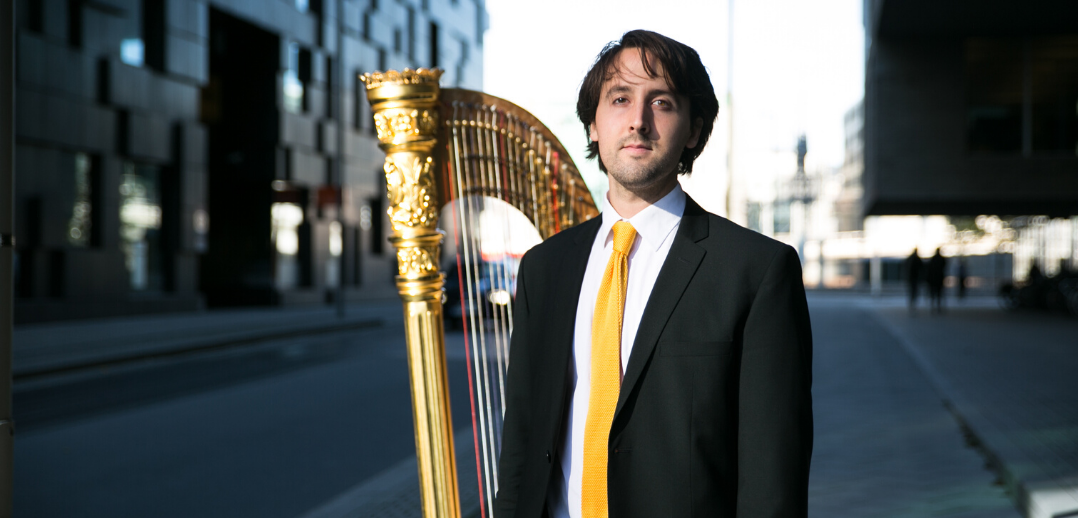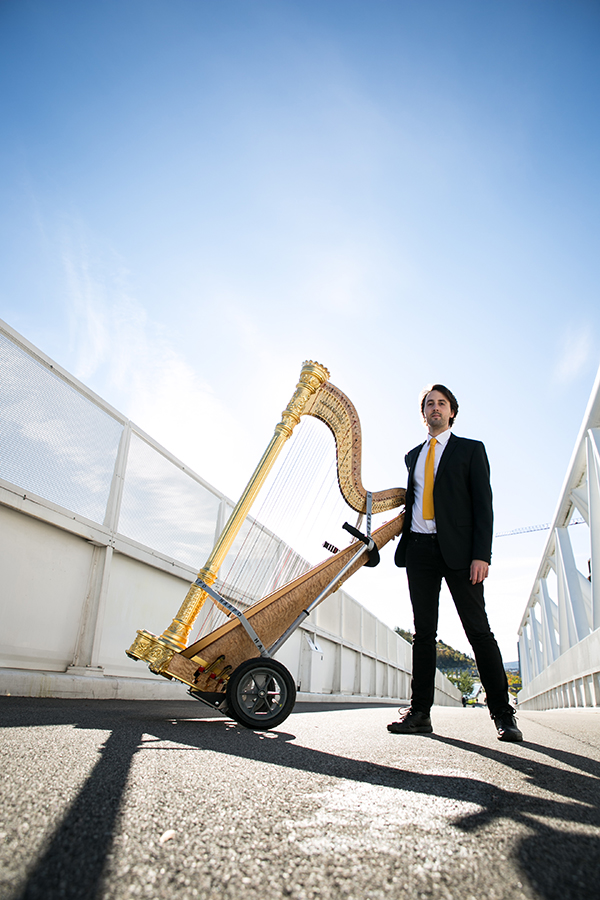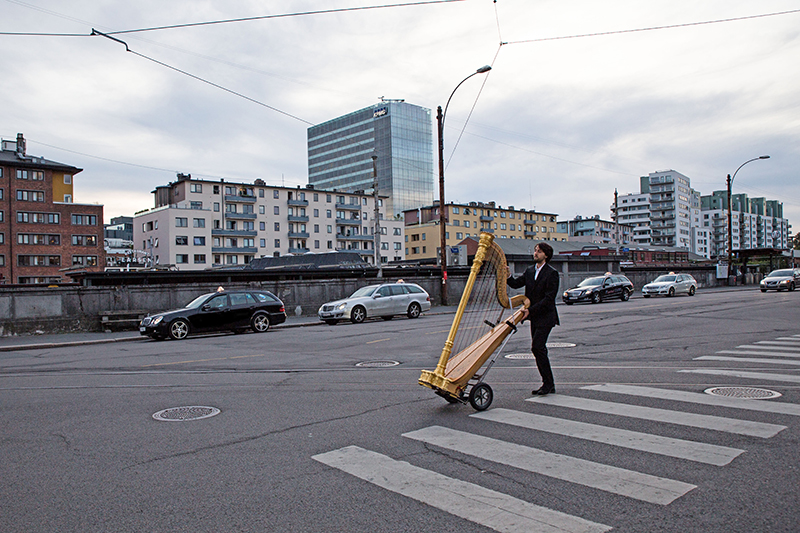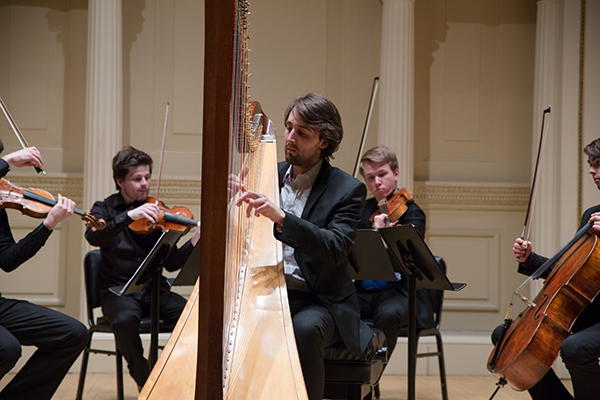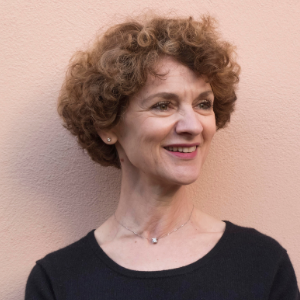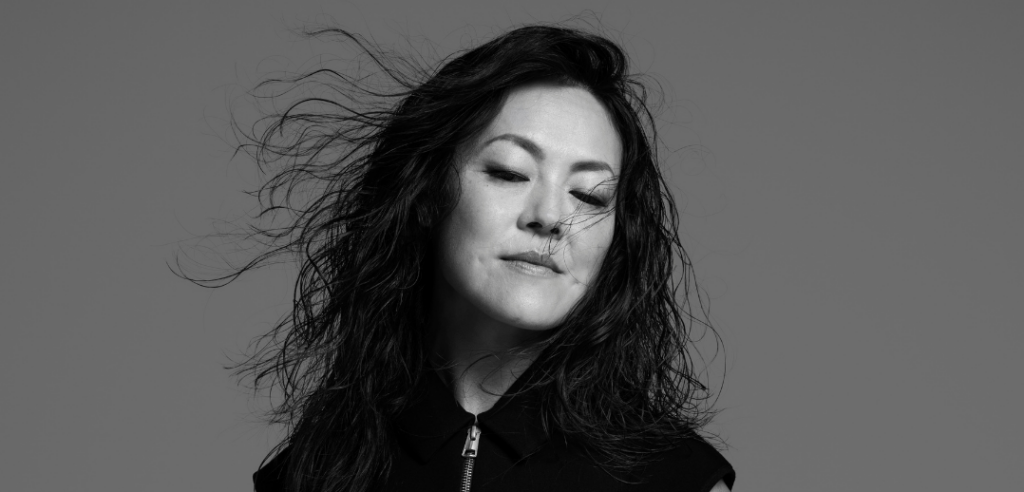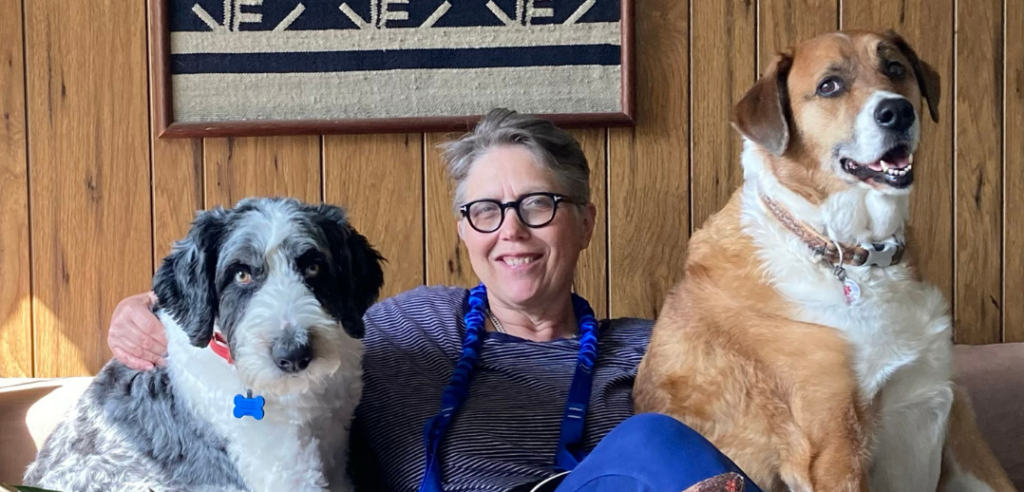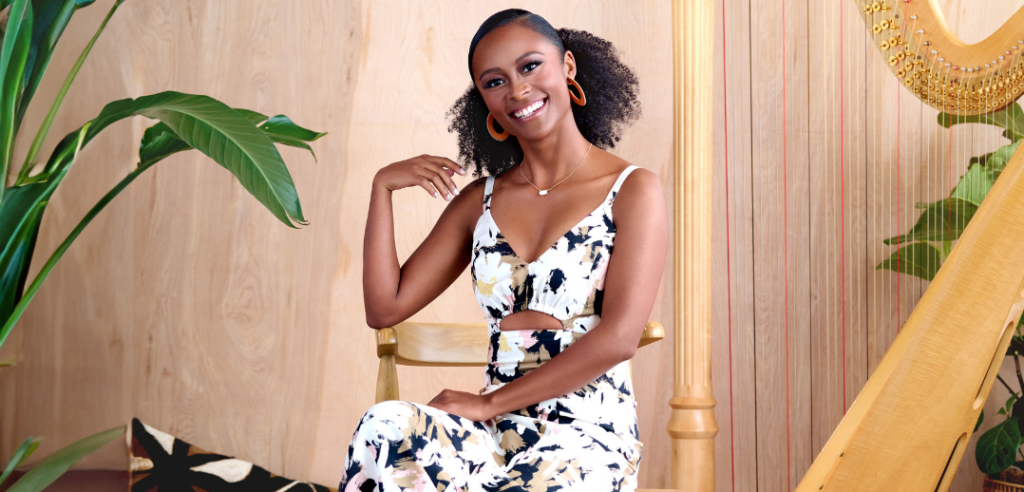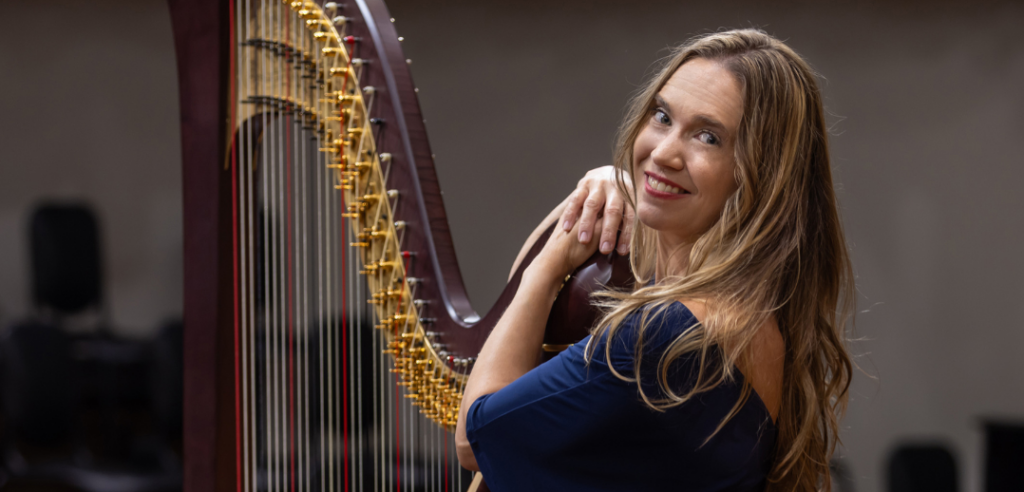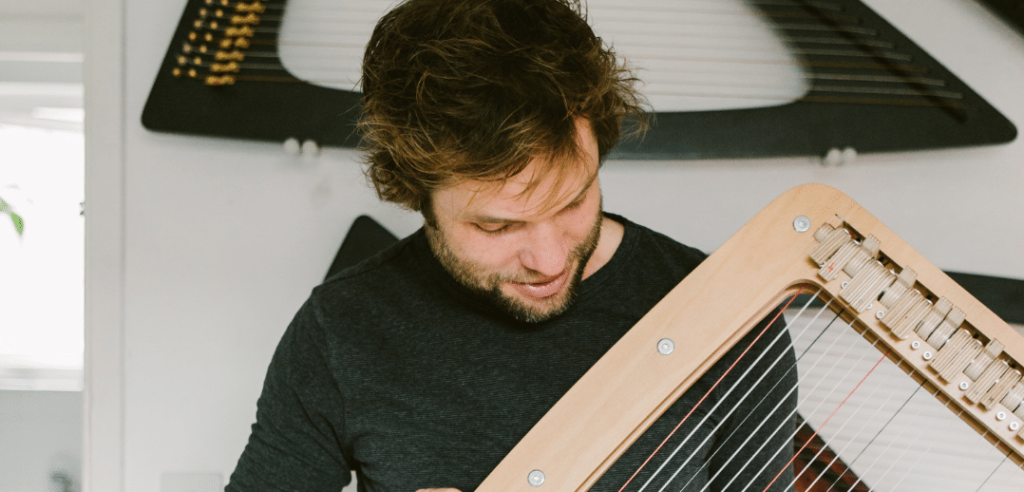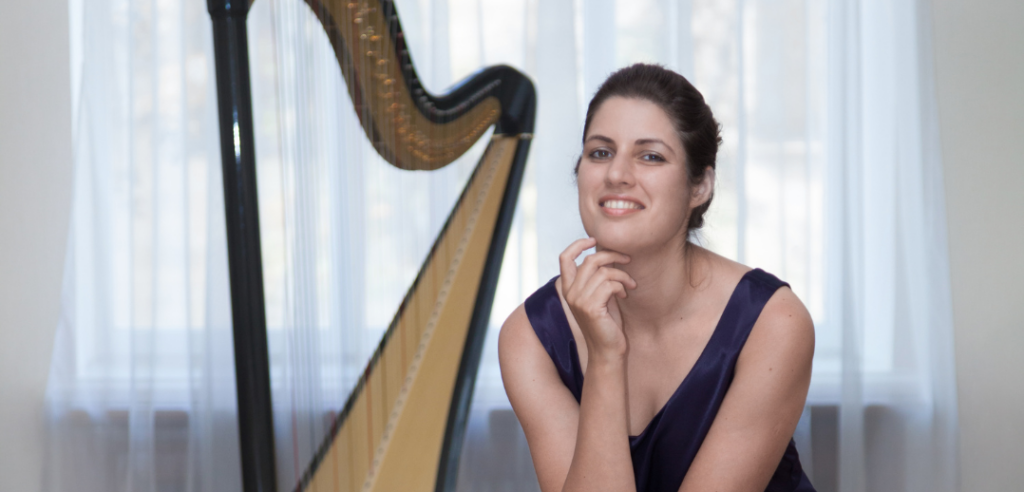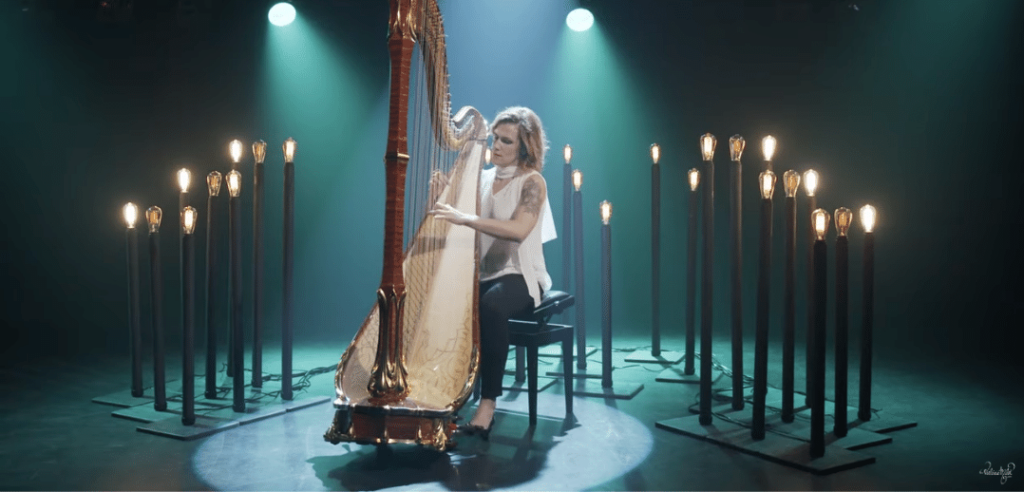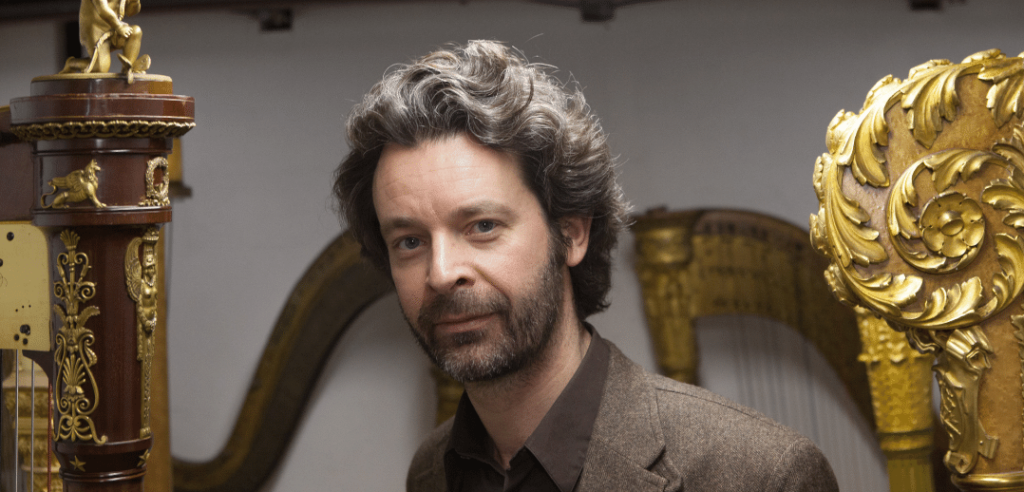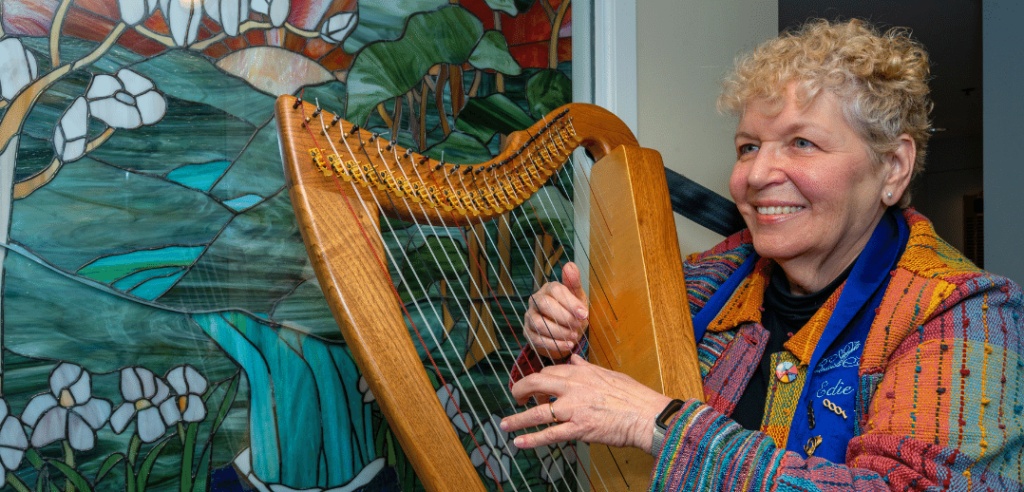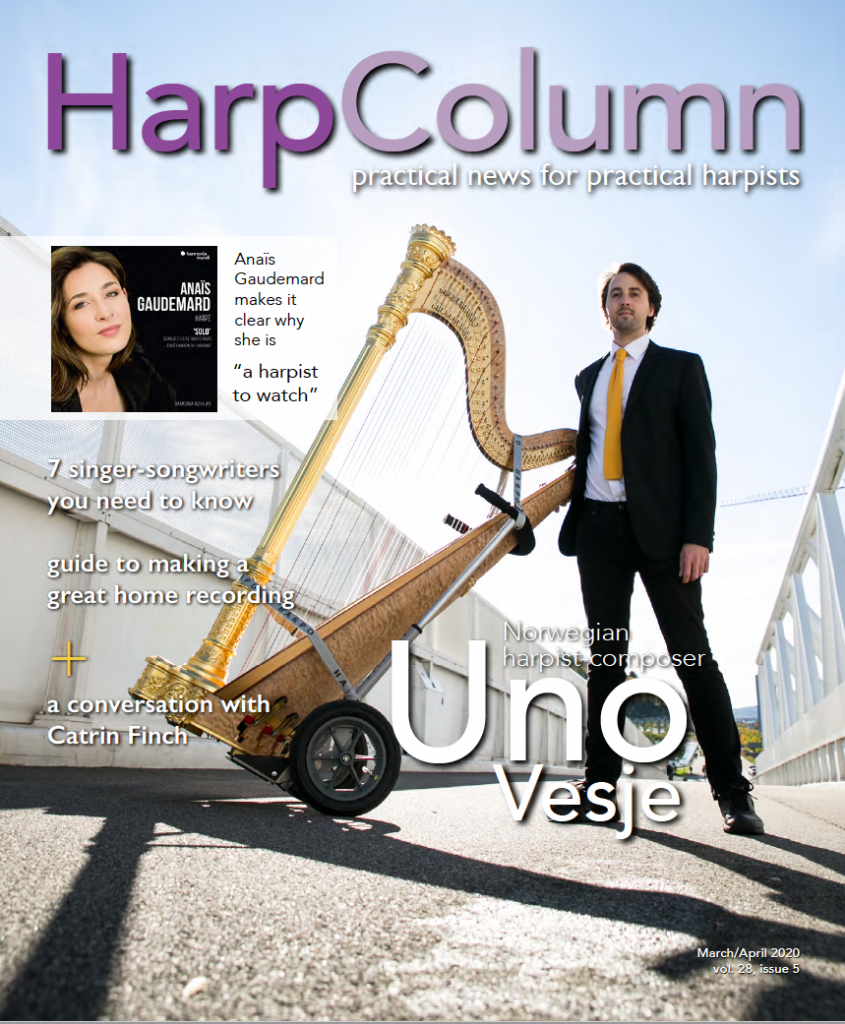photos by Camilla Storvollen
Uno Vesje first popped onto Harp Column’s radar screen back in 2014 when he released his first CD, Poems in a City, which our recording review editor Alison Young called “A stunningly beautiful, eye-opening and deeply touching album.” Each piece on that album was a world premiere—composed and performed by this young Norwegian, only 24 years old at the time. Three years later, Vesje’s second recording of original works, Oslo(ve), earned even more praise. So when Vesje won the USA International Harp Competition Ruth Inglefield Composition Contest in 2018, it wasn’t entirely a surprise. What did make us sit up and take notice, though, was that this was only the second time this competition gave its top prize to not just a composer, but a harpist-composer.
There is a rich tradition of harpist-composers in the harp world filled with legendary names like Hasselmans, Tournier, and Salzedo. To see a new name on that list is exciting, and we knew we needed to find out more about Vesje. So for our year-long series of cover interviews featuring harpists figures you might not know, but should, Uno Vesje seemed like an obvious choice. We asked Isabelle Perrin, Vesje’s former harp teacher at the Norwegian Academy of Music, to sit down and interview him in Oslo. Though Vesje’s first language is Norwegian and Perrin’s is French, both graciously agreed to have their conversation in English for Harp Column readers.
HC: Of course I’ve known you for a number of years now, even from your early pieces. It’s always amazed me how much imagination you have on your instrument. Even though we are in the 21st century and a lot of composers have come up with a lot of ideas, you still find new ones that no one has thought about, and that’s amazing. How do you come up with those ideas?
One of my biggest passions is making music and sounds that are meant only to be played on the harp
UV: Maybe because I started playing harp quite late, everything was new. Like in the Next Stop piece I used wet paper, and that sound I found just by cleaning my harp. [Laughs] And I thought “This sounds so awful, like the screaming sound from a train that is stopping, I have to use this in a piece.”
HC: You also use the sound of your feet [in Next Stop].
UV: Yes, because it’s not just strings—you have a body and all other parts at the instrument. Who said you can’t use everything?
HC: If you had to do something other than playing the harp and composing for a living, what would you do?
UV: That’s difficult. I love to create and to be creative. Maybe I’d be a farmer. I like to be outside. I have to be passionate about what I do, otherwise I can be lazy.
HC: We can see you put a lot of nature in your pieces, so there must be a connection there.
UV: Yes.
HC: So perhaps we will hear animal sounds from the farm in your next piece.
UV: Yes, you will actually hear sounds from a farm animal in my project, Our Planet, Our Future. But sadly it’s not from an idyllic farm but from the daily suffering in a slaughterhouse. It’s a very emotional and painful movement of the project and a sound that is hidden from us consumers. I got deep traces in my fingernails from making the base wires scream like the pigs.
HC: We in the harp world have a number of amazing harpists who are always amazing composers. Of course Grandjany, Salzedo, Renié, Hasselmans, and all those. Have any of those harpist-composers inspired you more than another one?
UV: The last couple of years I’ve been really inspired by Tournier because his way of writing for the harp is very unique. You can only play his pieces on the harp, and that’s amazing because so much of the harp repertoire is taken from the piano or the guitar. One of my biggest passions is making music and sounds that are meant only to be played on the harp. The harp is a harp, with all its wonderful possibilities and colors. If you always strive to sound like a piano, maybe you should switch to piano. We still have a long way to go to make a big and unique harp repertoire, and our wonderful harpist-composers have opened a door to reveal musical and technical possibilities found in the harp.
HC: What is also amazing about Tournier is all the different kinds of music you hear in his writing. It feels like he must have traveled everywhere, but actually he never traveled. It’s all from postcards he got from his nephew.
UV: That’s amazing.
HC: Do you have any new compositions to be published soon that you can tell us about?
UV: Lyon & Healy publications will publish my harp concerto Bragi’s Harp; it’s more or less my third harp concerto. It’s a really romantic piece, inspired by Norwegian folk music—like Edvard Grieg, but on the harp. Lyon & Healy is also publishing a piano reduction so you can play it with an accompanist. It will be available both in digital and print formats.
HC: Well, it’s just amazing with such a young person—how old are you?
UV: I’m 30.
HC: To be 30 and to have already published so much music is wonderful.
UV: Yes, it’s really nice. After the USA International Harp Competition, I started to publish my music. Before that people would always email me and ask me for my music, so I wanted to have a publisher in the harp world.
HC: We spoke about the harpist-composers that have inspired you, but are there any other musicians who are inspiring you right now?
UV: I listen to a lot of jazz music.
HC: So maybe that’s why your music is so free?
UV: Yes, maybe. I like the freedom because some people think the performing artist should be very strict to what the composer wrote. But really, there is so much art in being a performer as well. The performer needs to have the freedom to express themselves.
HC: So it seems that you like when the performer takes charge of the music.
UV: Yes, yes! I want them to put their signature on the performance.
HC: It’s very interesting, because this is what we dare to do less.
UV: Yes, and you have the folk music tradition, and jazz, and popular music, and even the Baroque era where the composer and the performer were the same. We have become more and more strict and divided I think. Art should be free; it is not reconstruction of the past that takes us forward, but it is, of course, good to know your history.
HC: But at the same time, whether it’s Baroque music or jazz music or your music—it’s really strong rhythmically, which makes it challenging. I think the difficulty is having this steadiness and strong rhythmic structure, and also the freedom at the same time.
UV: Of course, some music cannot be totally free. There are always some frames. If an important part of the music is a steady rhythm, then it needs to be steady, but maybe you can be free in the melody or dynamics.
HC: If you look into the future, where do you see yourself 10 or 20 years from now?
UV: Oh, that’s hard.
HC: Or what are your dreams? Although, I’m sure a lot have been achieved already.
UV: Yes, some dreams have. I feel so fortunate that I can make a good living being a performer and composer, and that I’m starting to get in a position where I can choose my own artistic projects. One of my dreams for the future is to find balance—balance between my private life and professional life. Balance between my performance career as a harpist and as a composer. My musical dreams are to have the opportunity to make music with some of the greatest artists, to constantly develop as an artist myself, and make projects that inspire other people. As a composer I suddenly have all these amazing commissions from some of my favorite performers in Norway and abroad, many new solo pieces for harp, a harp/viola/flute trio for the Oslo Philharmonic Orchestras chamber series and my first commission for harp and choir in 2021. My biggest fairytale dream is to open people’s minds and change the world through the harp. Luckily, I have approximately a lifetime to try to reach that one.
HC: Norway is really an amazing country, because there are still so many opportunities and Norway is still supporting the arts in so many ways when other countries are going the other way. As a composer, do you ever plan to write for instruments other than the harp?
UV: I actually did my first piece without the harp last summer. I played my harp concerto Bragi’s Harp in a festival with the Bergen Philharmonic Youth Orchestra, and they liked it so much that they commissioned me to write a new orchestral work for them, but they didn’t have a harp. So I wrote this piece for youth orchestra and mobile phones called symPHONEy.
HC: Wow!
UV: Yes, it’s kind of a fun piece. I used familiar sounds from mobile phones, like melodies or the sound of writing text messages, wrapped up in a big melodic orchestral sound. It’s like the Young person’s Guide to the Orchestra in the time of mobile phones.
HC: You’re very successful for someone so young, yet a lot of harpists might not know much about you yet. So tell us, what came first—the chicken or the egg? Are you a composer first or a harpist first?
UV: Actually, the composer came first. I started composing when I was probably 8 or 9 years old. I played piano and flute and I composed a piece for my school’s marching band. I just loved everything about music and instruments, so I really just played them all. In Norway there were so few harpists and so few harps, I had never seen one. I was in L.A. for a couple of months when I was a teenager, and I bought this tiny little Celtic harp.
HC: You just saw one in a store?
UV: Yes, I saw one in a store, and I just had to buy it. It cost like $1,000. I used all my savings. Then we met some people playing folk music in California. So it started with just improvising on the Celtic harp. Then when we came back to Norway, my parents contacted Willy Postma [who was the harp teacher at the music academy in Oslo at the time], and then I had a few lessons with Birgitte Volan Håvik in the Oslo Philharmonic Orchestra. Then I stopped with everything that had to do with music for a couple of years.
HC: So you stopped playing the harp?
UV: I stopped everything—playing the piano, playing the harp, composing. I didn’t do anything. I just did theater. It was a very hard time for me. I was the only one in my entire school doing music, and it was not so popular. I was tired of being this abnormal kid. Everything was sort of falling apart at school, and then I suddenly decided I wanted to go to music high school, so I started taking piano lessons again. I worked really hard at school, because it was the most difficult class to get into. At the music high school you had to have a main instrument and a secondary instrument, and I had this old harp my parents had bought from Willy, and there was this wonderful German harpist, Tobias Southcott, that moved to Norway at the same time, so I picked harp as my second instrument. He was a really inspiring and good teacher. Eventually I was doing more and more harp and less and less piano. I decided I wanted to be a musician and I wanted to be a harpist. I applied to the Norwegian Academy of Music, and I was so nervous. I was so fresh—I had only played the harp seriously for one year. You would have never accepted me. [Laughs]
HC: [Laughs]
UV: But there were no other applicants at the time, so I managed to get in. I worked so hard the first couple of years with Willy Postma. I practiced four hours every day—so structured. Then, suddenly, a part of me remembered this thing about composing and making music. I used so much time practicing the standard harp repertoire, I felt like I was not finding my own voice. This is not my story, this is Hasselmans’ story. So then I did more and more composing. I remember my first composition, Footsteps in an Empty Room. I was so nervous bringing it to Willy, because I wanted to ask her if I could play it on my second-year exam. She said yes, and I was so happy. So then I composed something new for every performance exam. And then, in my last master’s degree recital I composed the entire program. It has just felt right. I do all this beautiful repertoire with the symphony and the opera, so I learn all the standard repertoire. When I do recitals I always do my own music, and maybe a few other things I like.
HC: But this actually makes a lot of sense now that I know you did theater, because there is so much acting in your pieces. So you probably took something from there also.
UV: Probably. I like mixed art. I do a lot of projects with dancers. Other arts like visual arts, dance and theater and even food inspire me so much in music and life.
HC: Being a harpist and a composer, do you see advantages or challenges doing both?
UV: One of the biggest challenges is to not be lazy and make things too easy, not pushing myself as a composer and a harpist. Usually when I do orchestration I use piano as the composing tool, because it’s more flexible and you have all of the notes in front of you, so you don’t have to think through all the pedals.
HC: Your composition Life is Flashing Before My Eyes, and I Realize That It All Started with a Blackbird won the 2018 USA International Harp Competition Ruth Inglefield Composition Contest in Bloomington and was performed in the 2019 USA IHC. Tell us what that experience was like for you to win the competition, then to hear your work performed by all of those talented competitors?
UV: When I first got the email that I won the composition competition, I was of course very happy because I had applied three or four times. The first time I submitted a piece, I really wanted to win; I was young. Then I thought, I am going to do this not necessarily to win, but I just want to show my harp compositions every three years. So it was a bit shocking when I won, because now I cannot submit any more pieces. [Laughs]
HC: So it was like a routine that now you couldn’t do anymore?
UV: Yes. [Laughs] But of course it was a special moment when I read the announcement.
HC: Yes, because it is so rewarding to be recognized as a composer.
UV: Especially because I’m a harp composer and to be recognized by the harp community was really nice.
HC: Did you hear lots of difference between all of the performers?
UV: Yes. Some were quite straightforward and strict to the score. There were three performances where I thought they were really passionate and I saw the person behind the strings. It’s actually quite touching to see people learn your music and really work hard on it and try to make the best of it. I know as a musician that it’s a lot of work to learn a new, difficult solo piece.
HC: Are there other techniques you use when you compose?
UV: I’m quite free. I’m not a theoretical person, so I usually just make a story or a scene in my head and build the composition around my imagination.
HC: More or less we should go through that same process when we perform something.
UV: Yes, that was probably the first thing Tobias Southcott taught me. Just to have a picture about everything you play, and it helps in creating the sound you want to make.
HC: When you are learning to play a new piece on the harp by another composer, how does your perspective as a composer come into play?
UV: In the beginning, I was probably more concerned with technical issues. But one thing you and Willy [Postma] taught me was to look for phrasing and melody and the idea behind the piece. So now when I get a badly written part, I just make small adjustments to make it work technically, because that helps to get across the idea in the music. Of course if it’s a big solo piece or a concerto, I talk to the composer, but sometimes you just have a new piece on your music stand and very little time to prepare.
HC: How much of you being Norwegian goes into your music?
UV: More and more, I think. My harp concerto is really inspired by Norwegian folk music. I think I saw the quality of Norway much clearer after my studies with Deborah Hoffman in New York. Norwegians are very independent, and there is a simplicity and clarity in our nature and being. It is difficult to describe.
HC: Yes, but someone in Norway knows very well what you’re talking about.
UV: Norwegian folk music is so beautiful. There is a community for harpists playing Norwegian folk music, but so many of the instruments and the knowledge of this tradition were lost, so I tried to imagine how this music would feel and sound like on the harp.
HC: What advice do you have for young harpists who are inspired by what you’ve done as a harpist and composer?
UV: Just do it. Go for it. As an artist, you have to do what you believe in, even though there might be more “prestige” in doing something else, you always have to listen to your inner voice. It’s a lot of work and turbulence to be a musician, so you have to be passionate about it. If your passion is to write, you should definitely start writing, and you will be a much better harpist by playing what you like to play. Composing will take your eyes off the score and to the strings, and open your ears.
HC: What do you see for your future?
UV: My vision has started to change a little bit. In the past, I more or less only composed to have something fun to play, to entertain, and to give beautiful music to the audience. But now my vision is more about using the harp as my voice to tell stories and express emotions. I think you will hear more of my political and philosophical perspectives in my compositions for the future. I’m working on this huge solo piece (40 minutes long) for the Helsinki Harp Festival, with the title Our Planet, Our Future, about the climate crisis. Music can be beautiful and entertaining and even healing, but it can also be a very powerful political device, and it is time to use the harp in that way. I tested one of the parts in this project—it’s called “Greta Thunberg”—where I sample parts from her speeches and then play over them. I played this in a small venue in downtown Oslo and there were some people in the audience who worked in the business district. They came to me afterwards and said that the performance and the piece really made them think about what they are doing in their life, which was the biggest compliment to me, or, the compliment is really to Greta—I just accompanied her. I think art can wake people up. Hopefully my upcoming projects will be more like this. I really enjoy every moment I find a new sound or a new way to use the harp. I really love to develop the possibilities on this great instrument and to take the listener into a new world. •
A peek inside Uno’s world
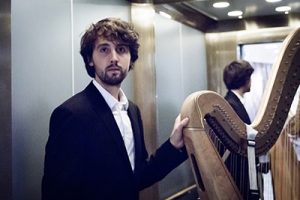
On my music stand right now: “Die Walküre for Trondheim Symphony Orchestra & Opera next month, Ein Heldenleben for Oslo Philharmonic and Dialogue (for two harps) by Halvor Haug, a Norwegian composer. I will play Dialogue together with Birgitte Håvik in Helsinki. And, of course, a lot of sketches for my new projects.”
What I’m listening to right now: “I’m on a jury of this big music competition, so I’m listening to lots of different music right now from popular music to jazz to contemporary classical—a lot of contemporary and jazz music from Norwegian composers.”
Favorite smartphone app: “My metronome. I use it all the time.” [Laughs]
My harp: “I have a Lyon & Healy 23 gold.”
Favorite compositional technique: “I’m not sure if this is a technique or not, but drifting away while playing, improvising.”
Corrections: Last year, the USA International Harp Competition Composition Contest was renamed the USA International Harp Competition Ruth Inglefield Composition Contest in honor of its founder, director, and jury chairperson who passed away in 2019. The original article incorrectly stated that Uno Vesje was the first harpist-composer to win the the USA IHC Ruth Inglefield Composition Contest. Harpist-composer Michael Magnuco won the contest in 2009, making Vesje the second harpist-composer to win top honors.





